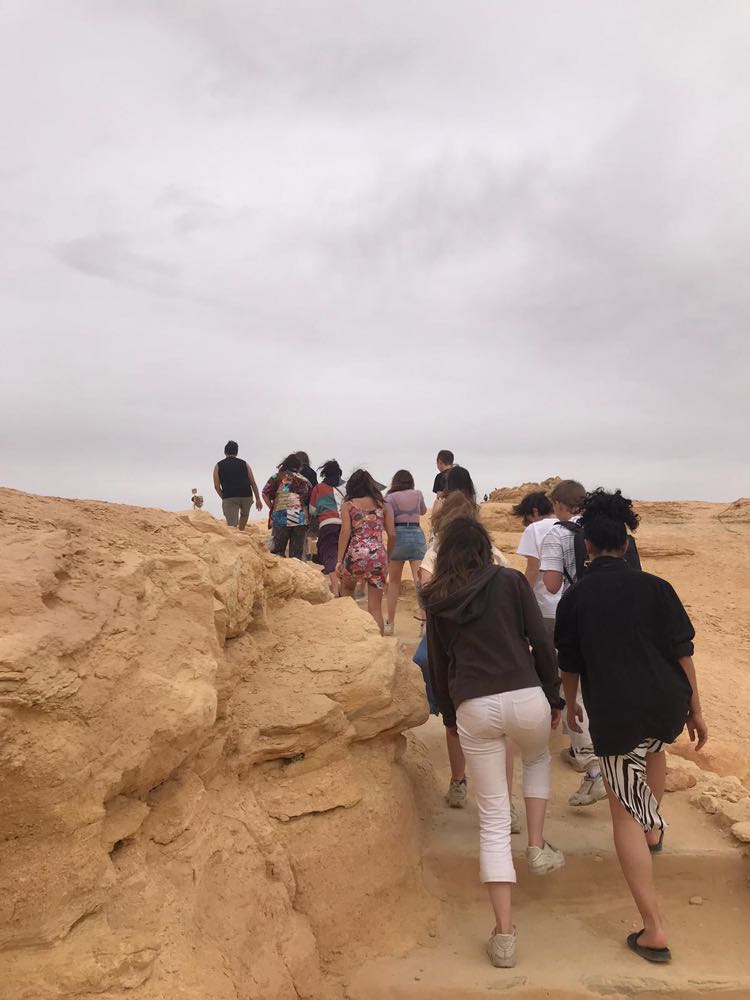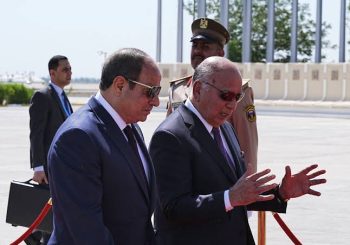“Non-European languages and literatures” was reportedly the least popular degree choice for UK students in 2019. Every year, Egypt welcomes a number of students studying Arabic at universities in the United Kingdom who make the seismic shift of moving from Britain for their ‘year abroad’ to further their grasp of not only the Arabic language, but of Egyptian culture.
Twelve universities in the UK currently offer undergraduate degree programs with the opportunity to study Arabic. According to a 2014 study by the University Council for Modern Languages and the Association of University Language Centres, there has been a ‘continuing upwards trend’ in the number of students studying Arabic at UK universities whilst European languages’ popularity amongst students, such as French, has been declining.
Teaching methods vary, with most universities opting to focus study around Modern Standard Arabic. Knowledge of dialects is then increased when students spend time studying in an Arabic-speaking country. This is known as ‘year abroad’, and most students are required to spend around eight months living in an Arabic-speaking country as an integrated part of their degree program.
The most popular and renowned year abroad location for UK students was Syria, but due to its ongoing civil war other locations have become increasingly popular over the past decade. Jordan has been favoured in the past few years due to concerns around safety for students in Egypt and the unfolding political crisis in Lebanon. But as of 2020, many year abroad students from the UK have found themselves in Egypt for the year as a result of more lenient COVID-19 border controls.
One of the most renowned centres for study in Egypt is The American University in Cairo (AUC)’s Centre for Arabic Study Abroad. Their statistics show that despite a steep decrease in the number of study abroad students in 2011, the centre has seen “a steady increase over the past three years” and numbers are “slowly, but surely, climbing back to its peak of previous years.”
Unsurprisingly, there are countless hurdles along the way for students who move from the UK to Egypt for the year to study – but also some pleasant surprises.
WHY ARABIC?
Georgia, a 21-year-old British student from the University of Cambridge living in Cairo, describes that most Egyptians she meets are confused by her choice of degree.
“They’re always very surprised. Like they’d say ‘oh wow, that’s great, but why?’ Especially when they find out we’re learning Modern Standard Arabic and Egyptian dialect at the same time,” says Georgia, who is studying with ‘Arab Academy’, a language school in Garden City.
For most of the students, Arabic seems to be a choice that they chanced upon with little forethought. Stephanie, a 21-year-old Polish student, is studying for an undergraduate degree Arabic at the University of Edinburgh. She is currently living in Egypt for the year but is studying online with a language school in Jordan – a confusing combination borne of her University’s refusal to grant permission to study abroad during the pandemic. She made the dramatic change from studying Biochemistry to choosing Arabic.
“Biochemistry didn’t make me feel fulfilled,” she explains. “I love languages, but Arabic still felt like quite a random choice. I went with it as I was interested in exploring Middle Eastern culture and I remember the first week when I was learning the alphabet, I was just so mesmerised and at that point I knew I’d made the right decision.”
This is a sentiment very much shared by Sam, a British student aged 21 from Yorkshire, England, studying Arabic at Cambridge. He is currently living in Cairo studying with AUC’s study abroad programme. He chose Arabic by necessity of having to study another language alongside French, but it quickly became the focal point of his studies. According to him, “with Middle Eastern Studies, you really have to examine and criticise your own values in a way which you don’t experience when you study European history and culture.”
For Sam and Stephanie, Egypt was the obvious choice – primarily for the diversity which it offers. “I think when we say diversity in the UK we mean cultural diversity, people from different nations,” Sam explains.
“But Egypt is economically diverse, it’s socially diverse, it’s diverse in people’s opinions and their values. And all of that is present in this tiny tiny strip of land by the Nile. The concentration of different people and world views is insane.”

SAFETY AND HARASSMENT
When chatting about the differences between their experiences in British and Egyptian society, students reported feeling safe in Egypt – or at least, no less safe than they would feel in any European capital city.
One feeling was shared between the female students; their initial perceptions about safety and harassment in Egypt were proven wrong.
“I think I really geared myself up before I came to be harassed on the street,” Georgia explains. “But I haven’t been as harassed as I thought I would be. And if I am, it’s always like nice things that they’re saying such as welcome, how are you? Where are you from? That surprised me. I thought I’d be targeted. But I haven’t really been.”
Lana, a British-Kurdish student living in and studying Arabic in Cairo, felt the same. “I think my first week here was almost more stressful because I was trying to see Egypt through this lens of being one of the worst places for harassment in the world.”
Whilst she describes experiencing daily street harassment just like all of her fellow female expat students, she feels that being Middle Eastern attracts her a lot less attention. Despite being incessantly asked “where are you really from” by Egyptians on an almost daily basis, she has grown to appreciate what she refers to as her ‘ethnic ambiguity’.
“I think it means that I can occupy a lot of spaces very comfortably and play each to my advantage. Because I am British, which gives me a lot of common ground with any European or expat here. But I think my experiences of being this cultural ‘in between’ in Egypt has meant that some people have trusted me with their stories or welcomed me more quickly into their circles, because I have this certain cultural understanding,” Lana explains.
“I have the basics of what it means to be ‘Middle Eastern’ and I know what it’s like to experience whiteness from the margins, so I feel I can find common ground quite quickly with Egyptians.”
CULTURAL SHIFTS
To say that there are cultural differences between other countries such as the United Kingdom and Egypt would be potentially the biggest understatement of all time, and the students have had to confront these head on. One was clear from the moment they arrived – the noise.
“The soundscapes of Cairo are just insane,” says Lana. “It’s incredible what sounds you get used to, horns, cats screeching, people shouting across the street. You think that there’s an argument but they’re just having a conversation.”
But this buzz about the city is something Stephanie enjoys. “Another thing that surprises me is how people just approach you and have a conversation. It’s a very different culture – I would never approach someone in Scotland and say hi, who are you and what do you do, but here, it’s such a normal thing. It’s one thing I love about Cairo that just isn’t on the radar in the UK.”
Bargaining culture is another thing that the students find to be drastically different. Coming from a world where every price is fixed to suddenly having to summon the confidence to haggle down the cost for everyday items in Arabic is no mean feat. “Yesterday I had to go back and forth with this man just to buy bananas. It’s so exhausting,” describes Stephanie. “You have to always be on your toes.”
And of course, another universally agreed-upon shift was adjusting to the classic Cairene chaos. To go from the punctuality and orderliness which pervade British society to Cairo, where even the concept of being on time seems to have a completely different meaning, has certainly been challenging for many of the students. “It’s like a universally agreed nonchalance,” a bewildered Lana describes. “They don’t seem to mind that everything is in constant utter chaos!”
But for Sam, the culture shock was less than he was expecting. “I think that in ‘the West’ we obsess over how supposedly different ‘the Middle East’ is, especially through the lens of Islam. But really, the culture is not a huge change – I could easily be in another Mediterranean country, like Greece or Spain. It’s funny how the element of religious difference seems to change our whole view of Egypt and puts it in a different sphere.”

INTEGRATION OR APPROPRIATION?
One of the main goals for any study abroad student is to absorb as much language and culture as possible in an incredibly short time frame. Some have described feeling pressure to ‘integrate’ as much as possible. The guidance from many university faculties regarding ‘year abroad’ is clear – ‘befriend the locals. Spend as much time speaking the language as you possibly can while abroad. Distance yourself from other English speakers.’
Many of the students have grappled with this idea of cultural integration, including Georgia. “I want to spend as much time speaking Arabic as possible, so I try and practise with Egyptians, but my Arabic simply isn’t good enough yet. So I naturally gravitate towards my other expat friends, or Egyptians who can speak good English, and then I feel guilty that I’m not speaking enough Arabic. But how can I expect myself to maintain friendships in a language that I can’t speak well?”
Some have come to doubt whether they should be searching for the ‘authentic Egyptian experience’, or whether that even exists in the first place.
“There’s a red line that we constantly have to navigate between things being appreciative and integrative, or problematic and maybe appropriative,” describes Lana.
“It’s hard to find a balance,” Sam explains, having also thought about his experiences navigating social situations and friendships in Egypt.
“I can get drawn towards extremely wealthy Egyptians who speak perfect English, but their way of life doesn’t always align with mine. But at the other extreme I don’t want to try and be this person that tries to romanticise the experience of a working class Egyptian – that’s a certain brand of pretending to ‘integrate’ that just doesn’t sit right with me.”
Despite the challenges and differences that a move from the United Kingdom to Egypt can bring, it is clear that all four of the students have enjoyed their time in Egypt immensely. “I’ve fostered a love for Arabic that I didn’t know I had,” says Georgia. “Egypt is just such an incredible, diverse, crazy place to live.”






Comment (1)
[…] understanding of the world’s diverse cultures and traditions. In addition, according to Egyptian Streets, a number of foreign students consider Egypt “an incredible, diverse, crazy place to […]